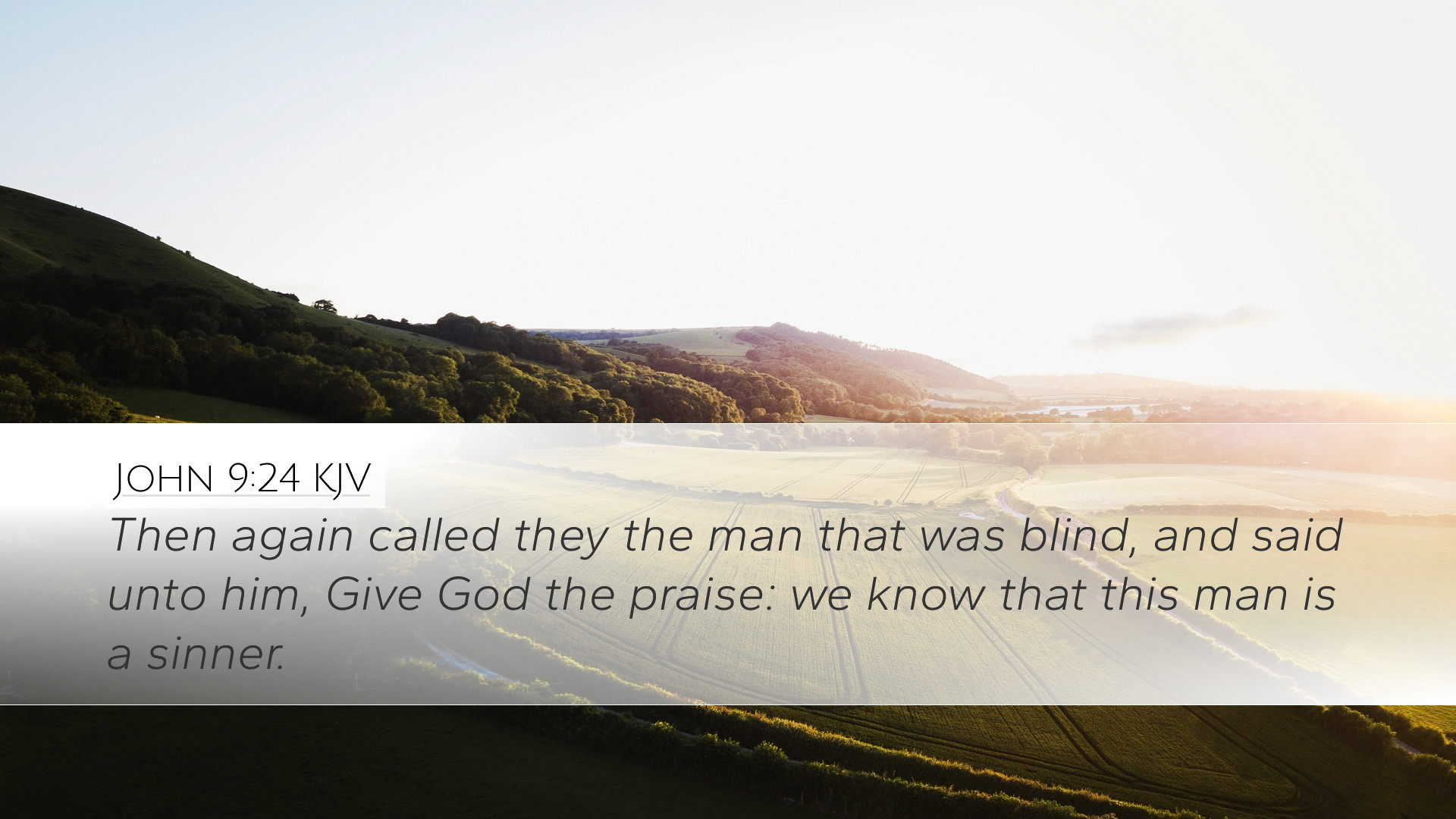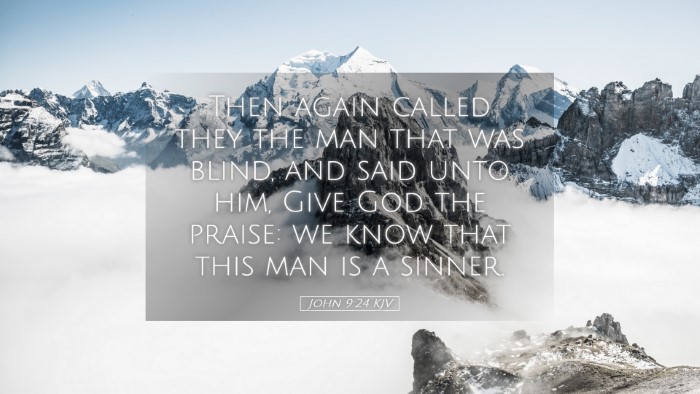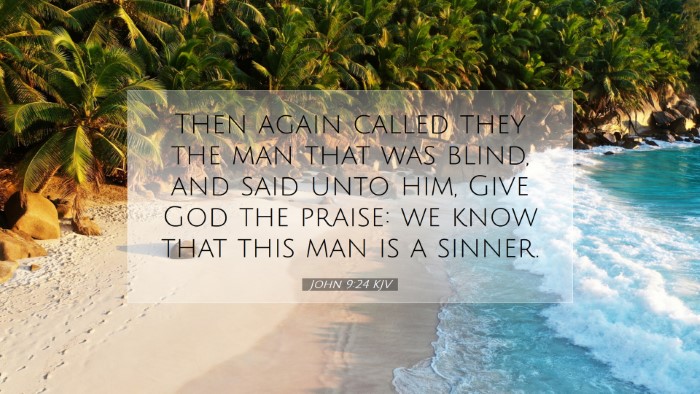Commentary on John 9:24
Verse: John 9:24 - "So they called the man who was blind and said to him, 'Give glory to God. We know that this man is a sinner.'
Introduction
In this verse within the broader context of John Chapter 9, we observe a significant moment in the narrative of Jesus healing the man born blind. The religious leaders, realizing the implications of the miracle, confront the healed man. Their request—“Give glory to God”—is laden with meanings that we will unpack using insights from renowned public domain commentaries.
Contextual Background
The healing of the blind man illustrates several themes central to the Gospel of John, including the revelatory work of Jesus, the conflict between light and darkness, and the notion of spiritual blindness. The Pharisees’ interrogation reflects their concern about Jesus' authority and the potential undermining of their religious standing. This tense atmosphere sets the stage for the man born blind to articulate testimony that highlights not only his physical sight but a deeper spiritual insight.
Commentary Insights
Understanding the Phrase "Give Glory to God"
Matthew Henry emphasizes that this phrase is charged with an implicit accusation. The Pharisees, using religious language, attempt to corner the healed man into denouncing Jesus as a "sinner" for performing a miracle on the Sabbath. This admonition, while sounding pious, reveals the underlying fear of the religious authorities. They recognize the miracle's authenticity, yet they want to place their system above the truth, showing a profound misunderstanding of God's character.
Pharisaical Logic
Albert Barnes notes the use of the term “sinner” here serves as a doctrinal weapon by the Pharisees. They employed it to discredit Jesus in the eyes of the healed man and the listening crowd. The religious leaders’ argument hinges on the assumption that good cannot come from a person who violates their version of the law. This exposes a critical flaw in their theology, which is rigid and lacks compassion. The irony lies in the fact that their rigid adherence to the law blinds them to the divine work occurring right before their eyes.
Personal Testimony and Identity
Adam Clarke offers insights into the healed man’s rising struggle with identity. As the confrontation intensifies, the man grapples with the implications of his healing in light of the Pharisees' challenge. He acknowledges the miracle and refuses to conform to the narrative dictated by the Pharisees. Clarke notes that the man’s testimony is compelling, ultimately asserting that while he may not be able to articulate the theological complexities, he knows he was blind, and now he sees. This personal, transformative experience is, in itself, a form of glorifying God.
Theological Implications
This interaction raises important theological considerations regarding authority, sin, and transformation. The Pharisees’ insistence on labelling Jesus creates a dichotomy of who can truly know God’s work. The healed man represents a fresh lens through which God's glory is seen. His encounter with Jesus serves as a template for understanding how God's works can transcend human structures of authority or knowledge.
Spiritual Blindness vs. Physical Sight
The theme of spiritual blindness is juxtaposed with the physical sight that the man now possesses. Matthew Henry poignantly points out that the actual blindness lies within the Pharisees, who cannot see the truth despite their religious zeal. Their demand for the man to “give glory to God” reflects a superficial understanding of glory that fails to recognize the very nature of God’s revelation through Jesus Christ.
The Role of Faith
Faith emerges as a critical element in this narrative. Barnes draws our attention to the progression of the blind man's faith throughout this encounter. Initially, he experiences the physical act of healing without much understanding; however, as the questioning continues, his faith evolves. He begins to understand that Jesus is more than just a miracle worker—he is the agent of God's grace. This mirrors a larger theological discourse in the Gospel of John about the nature of faith and recognition of Jesus as the Messiah.
Conclusion
In John 9:24, we find a multifaceted exploration of faith, identity, and the clash between divine revelation and human tradition. The Pharisaical challenge to the man born blind illustrates a critical moment in the narrative: a moment of confrontation where the healed man must choose between societal pressure and his transformative experience with Jesus. Public domain commentaries by Henry, Barnes, and Clarke collectively enrich our understanding of this text, presenting it as a pivotal moment not just for the man but for all who seek to comprehend the works of God through Christ. It is a call to recognize the light amidst the darkness and to embrace the truth that surpasses human understanding.
Further Reflections
- Consider how this narrative challenges your understanding of sin and righteousness in light of Jesus’ actions.
- Reflect on the implications of personal testimony in communicating God’s work in your life.
- Ponder the ways in which existing religious structures can sometimes blind individuals to the new work God is doing.


